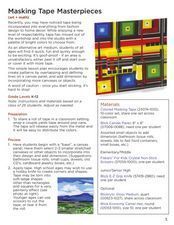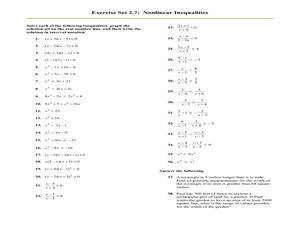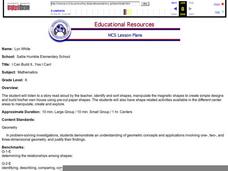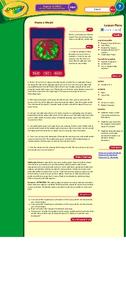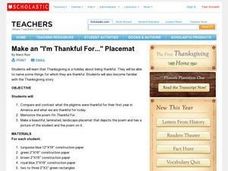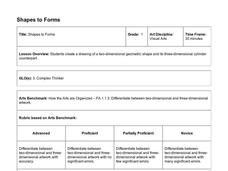Curated OER
Masking Tape Masterpieces
Learners create non-objective art based on the design elements of line, color, balance and movement using tape. This simple lesson plan encourages students to create patterns by overlapping and defining lines on a canvas panel. One of...
Virginia Department of Education
Order Up!
Order in the math class! Scholars learn to evaluate expressions using the order of operations. A game has them rolling number cubes to determine numbers to use when evaluating.
Alabama Learning Exchange
Polygon Perimeters
What are polygons? Learners find the perimeter of various geometric figures that the teacher has drawn in chalk on the sidewalk. A worksheet to record their measurements is provided. Get your third graders outside and exploring the world...
Curated OER
Which container holds a larger amount of popcorn?
What does popcorn have to do with math? Seventh grade mathematicians are provided an opportunity to develop a conceptual understanding of the formula for volume and to use it as a tool to solve problems. The lesson begins with a...
Pennsylvania Department of Education
Making Cubes
Third graders explore vocabulary associated with three dimensional figures. In this transformations lesson, 3rd graders create two dimensional nets for three dimensional figures. Students become familiar with describing two...
Pennsylvania Department of Education
Length and Perimeter
Third graders explore tessellations and the spatial concepts used in creating them. In this tessellations lesson plan, 3rd graders rotate, reflect and transform shapes to create tessellations. Students become familiar with...
Curated OER
Proving the Pythagorean Theorem
Young scholars solve problems using the pythagorean Theorem. In this geometry lesson, students complete proofs using the Pythagorean Theorem. They share their proofs and solutions with their classmates and family members.
Curated OER
Nonlinear Inequalities
In this Algebra II worksheet, 11th graders solve nonlinear inequalities, graph the solution set on the number line, and write the solution in interval notation. The one page worksheet contains thirty-eight problems. Answers...
Curated OER
Geometric Fractals and the Chaos Game
Students define fractals and patterns. They explore how a seemingly random process can result in a pattern. Students practice probability and fractions skills by playing the chaos game online.
Curated OER
Solving Applications Using Quadratic Equations
In this solving applications worksheet, learners translate word problems to number sentences. They solve the created quadratic equation. This three-page worksheet contains 12 problems.
Illustrative Mathematics
Shape Hunt Part 2
Shapes are everywhere in the world around us, from rectangular doors to the circular wheels of a car. The second lesson in this series opens the eyes of young mathematicians to this wonderful world of shapes as they search the classroom,...
Curated OER
Pythagorean Theorem by Graphic Manipulation
There are many different ways to show a proof of the Pythagorean Theorem. Here is a nice hands-on paper cutting activity that shows a graphic representation. You can even challenge your young Pythagoreans to come up with their own...
Curated OER
I Can Build It.....Yes I Can!
Kindergartners listen to a story read by their teacher, then use magnetic shape pieces to construct simple designes. They "build" their own house using pre-cut paper shapes. This age-appropriate lesson would be an excellent choice for...
Illustrative Mathematics
Toilet Roll
Potty humor is always a big hit with the school-age crowd, and potty algebra takes this topic to a whole new level. Here the class develops a model that connects the dimensions (radii, paper thickness, and length of paper) of a...
Curated OER
Weave a Wreath
Students follow directions to complete a multi-step process that results in an attractive holiday decoration. In this Christmas art activity lesson, students employ simple measuring and weaving techniques and experiment with the negative...
Pyro Innovations
Get into Shape
Shapes are so fun! Little ones explore, identify, and create shapes using tangrams or pattern blocks. The activity is intended to stimulate critical thinking while engaging learners through play and shape identification. Each child will...
Curated OER
Orbital path of Landsat
Students comprehend how Landsat satellites orbit teh Earth to produce images. They comprehend the elliptical path of satellites. Students recognize that a different orbital path is needed for different satellites to perform their tasks....
Curated OER
What Shapes Can You See?
Students investigate shapes in art. In this visual arts lesson, students examine the ancient Panamanian "Plaque" and identify the geometric shapes in the art piece. Students combine basic shapes to make an artistic picture of their own.
Curated OER
Searching The Word
Fifth graders review EOG math terms and definitions found in their math notebooks, and pick between 15 and 20 words to put in a word search.
Curated OER
Can You Build It?
Students investigate the concept of perimeter. They design there own figure and measure the perimeter of it. The lesson is given the context of the shape being a path that is traveled by a ladybug. This provides the shape of the plane...
Curated OER
"I'm Thankful For..." Placemat
Students discover the story behind Thanksgiving through comparing and contrasting what pilgrims were thankful for, memorizing Thanksgiving poems, and creating a placemat that depicts the poem.
Curated OER
Shapes to Forms
Here is a math lesson that is really a visual arts lesson in disguise! In it, pupils utilize their knowledge of geometric shapes and forms to create a detailed version of a cylinder. The instructions on how to go about the task are very...
Curated OER
Line and Shading = Shape and Form
Students collect natural objects and draw these objects with and without shading.
Curated OER
The Distributive Property
Students use a visual to introduce the Distributive Property. The lesson is chronologically numbered and follows a distinct plan. The class works with the teacher to complete the lesson. The plan is not written in a traditional way, but...
